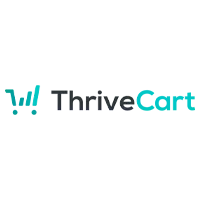
ThriveCart Alternatives for 2026
Save 40% on your SaaS stack with expert guidance
Free Consultation
ThriveCart vs. Similar Products
Select up to 3 Software, to enable Comparison
Compare Selected SoftwareEditorial Review: ThriveCart Alternatives Deep Dive
Table of Contents
ThriveCart is a popular checkout and cart management software, known for its ease of use, customization options, and one-time pricing model. However, several other tools in the market offer similar capabilities, making it essential to explore alternatives to find the best fit for your business.
In this guide, we’ll compare ThriveCart with ClickFunnels, SamCart, Kajabi, and Shopify, analyzing their pricing, features, pros, cons, and use cases to help you make an informed decision.
Top ThriveCart Alternatives
- SamCart
- ClickFunnels
- Kajabi
- Shopify
ThriveCart vs. SamCart
SamCart is another platform designed to streamline the checkout process, making it a strong competitor to ThriveCart. Both tools focus on improving checkout experiences and increasing conversions through features like order bumps and one-click upsells. However, there are key differences between ThriveCart vs SamCart.
Features
ThriveCart and SamCart both provide excellent checkout page customization and tools for boosting average order value through upsells, downsells, and order bumps. However, ThriveCart goes a step further with built-in affiliate management and a one-time payment option, while SamCart requires ongoing subscription fees.
SamCart also has a more modern, user-friendly interface and offers advanced analytics, making it easier to track conversions and customer behavior. However, neither ThriveCart nor SamCart includes built-in email marketing or full sales funnel-building features, though both integrate with third-party email tools.
Pricing
- ThriveCart: As mentioned, ThriveCart offers a one-time payment starting at $495, which includes lifetime updates.
- SamCart: SamCart operates on a monthly subscription basis, starting at $59 per month for the Launch plan, and increasing to $119 and $199 per month for the Grow and Scale plans, respectively.
Pros and Cons
ThriveCart:
- One-time lifetime pricing offers great value for long-term users.
- Built-in affiliate management features.
- Robust integrations with payment gateways and email marketing tools.
- Lacks landing page creation tools.
- More basic analytics compared to SamCart.
SamCart:
- Clean, intuitive user interface that makes setup and management easier.
- Advanced checkout features like abandoned cart recovery.
- Built-in A/B testing for optimizing checkout pages.
- Recurring monthly subscription can get costly over time.
- Limited native affiliate management capabilities compared to ThriveCart.
For businesses focused on minimizing costs, ThriveCart’s one-time payment is a significant advantage. On the other hand, SamCart’s advanced analytics and user-friendly design may appeal more to businesses that prioritize data-driven optimization of their checkout process.
ThriveCart vs. ClickFunnels
ClickFunnels is a comprehensive sales funnel builder designed to help businesses create entire marketing funnels, from landing pages to automated email sequences. While ThriveCart focuses on checkout processes and affiliate management, ClickFunnels offers a more extensive range of features designed for businesses looking to optimize every stage of the customer journey.
Features
ThriveCart excels in cart management, checkout customization, and affiliate tracking, making it perfect for businesses looking for a straightforward, user-friendly checkout system. ClickFunnels, on the other hand, provides a complete sales funnel solution, including the ability to create landing pages, run email campaigns, and manage sales pipelines. ThriveCart doesn’t offer these built-in funnel-building tools, though it can integrate with third-party solutions for email marketing.
Pricing
- ThriveCart: ThriveCart charges a one-time fee of $495, making it a long-term investment for those who want to avoid recurring costs.
- ClickFunnels: ClickFunnels operates on a subscription model, starting at $97 per month for the basic plan. The higher-tier plan, priced at $297 per month, includes more advanced features like affiliate management and email marketing.
Pros and Cons
ThriveCart:
- One-time payment, which can save money in the long run.
- Simple, intuitive checkout management.
- Comprehensive affiliate management features.
- Integrates with a range of third-party tools, including email marketing platforms like MailChimp and payment processors like PayPal and Stripe.
- Lacks email marketing features.
- Less robust in terms of sales automation compared to ClickFunnels.
ClickFunnels:
- Complete solution for building high-converting sales funnels.
- Includes tools for landing pages, email automation, and A/B testing.
- Ideal for businesses heavily focused on driving leads and nurturing them through funnels.
- More expensive due to the monthly subscription.
- Overkill for businesses that only need cart and checkout features.
If you’re looking for a simple, cost-effective checkout and affiliate management tool, ThriveCart offers a better deal, especially with its one-time payment model. However, if your business requires a comprehensive sales funnel system, ClickFunnels is the superior choice, offering a wide range of marketing tools to drive conversions.
ThriveCart vs Kajabi
Kajabi is a fully integrated platform for digital entrepreneurs, course creators, and membership site owners. While ThriveCart specializes in checkout and affiliate management, Kajabi offers a complete solution for creating and selling digital products.
Features
Unlike ThriveCart, which focuses solely on cart and checkout features, Kajabi provides tools for creating and marketing online courses, membership sites, and digital products. Kajabi also includes built-in email marketing, landing page creation, and automation features. ThriveCart, on the other hand, requires integrations with third-party tools to handle email campaigns and automation.
Pricing
- ThriveCart: One-time fee starting at $495.
- Kajabi: Pricing starts at $149 per month for the Basic plan, with higher-tier plans offering more advanced features.
If you’re looking for a checkout tool and affiliate management system, ThriveCart is the better choice, especially for businesses on a budget. Kajabi, however, is ideal for course creators and digital product sellers who need a fully integrated platform to manage everything from content creation to marketing.
ThriveCart vs Shopify
Shopify is one of the most popular e-commerce platforms for businesses looking to set up online stores. While ThriveCart focuses on checkout and cart management, Shopify provides a complete e-commerce solution, including product listings, inventory management, and payment processing.
Features
ThriveCart excels at managing checkout processes and affiliate programs but does not offer store-building or inventory management features. Shopify, on the other hand, is a comprehensive platform that allows businesses to create online stores, manage products, and handle all aspects of the sales process.
Pricing
- ThriveCart: One-time fee starting at $495.
- Shopify: Pricing starts at $39 per month for the Basic plan, with more advanced plans available for larger businesses.
Shopify is the go-to solution for businesses that need to create a fully-fledged online store. ThriveCart is more suitable for businesses that already have an online presence and want a more flexible checkout and affiliate management tool.
ThriveCart Alternatives Conclusion
Choosing the right alternative to ThriveCart depends on your specific business needs. If your focus is purely on checkout management and affiliate tracking, ThriveCart’s one-time payment and ease of use make it an excellent option.
However, if you need more comprehensive tools for building sales funnels, managing digital products, or creating an online store, platforms like ClickFunnels, SamCart, Kajabi, and Shopify offer specialized features that could be a better fit for your business model.
Each platform brings unique strengths to the table, so evaluating your long-term goals and requirements will help you make the best choice.
*If you want to read more in-depth about how ThriveCart stands in front of these tools, check these comparisons and make an informed decision.







